BULAW5916 Taxation Law: Analysis of Harding v Commissioner of Taxation
VerifiedAdded on 2022/09/16
|12
|2517
|22
Essay
AI Summary
This essay provides a comprehensive analysis of the Harding v Commissioner of Taxation cases, focusing on the implications of the judgements on Australian tax law. The analysis begins with an overview of the Australian Taxation Office (ATO) and the determination of tax residency, particularly for individuals living and working abroad. The essay examines the impact of the 2018 and 2019 court decisions, highlighting how the rulings have affected Australian expats and their tax obligations. It delves into the ordinary concepts test and the complexities of determining a permanent place of abode, discussing the limitations of these concepts. The essay explores the meaning of 'resides' and the factors considered by the courts. The analysis also covers the implications of the judgements for the ordinary concepts test and the permanent place of abode, emphasizing the relief provided to Australian expats. The essay concludes by summarizing the key takeaways from the Harding cases, including the lack of precision in determining residency and the limitations of the ordinary concepts test, and the broader implications for tax law.
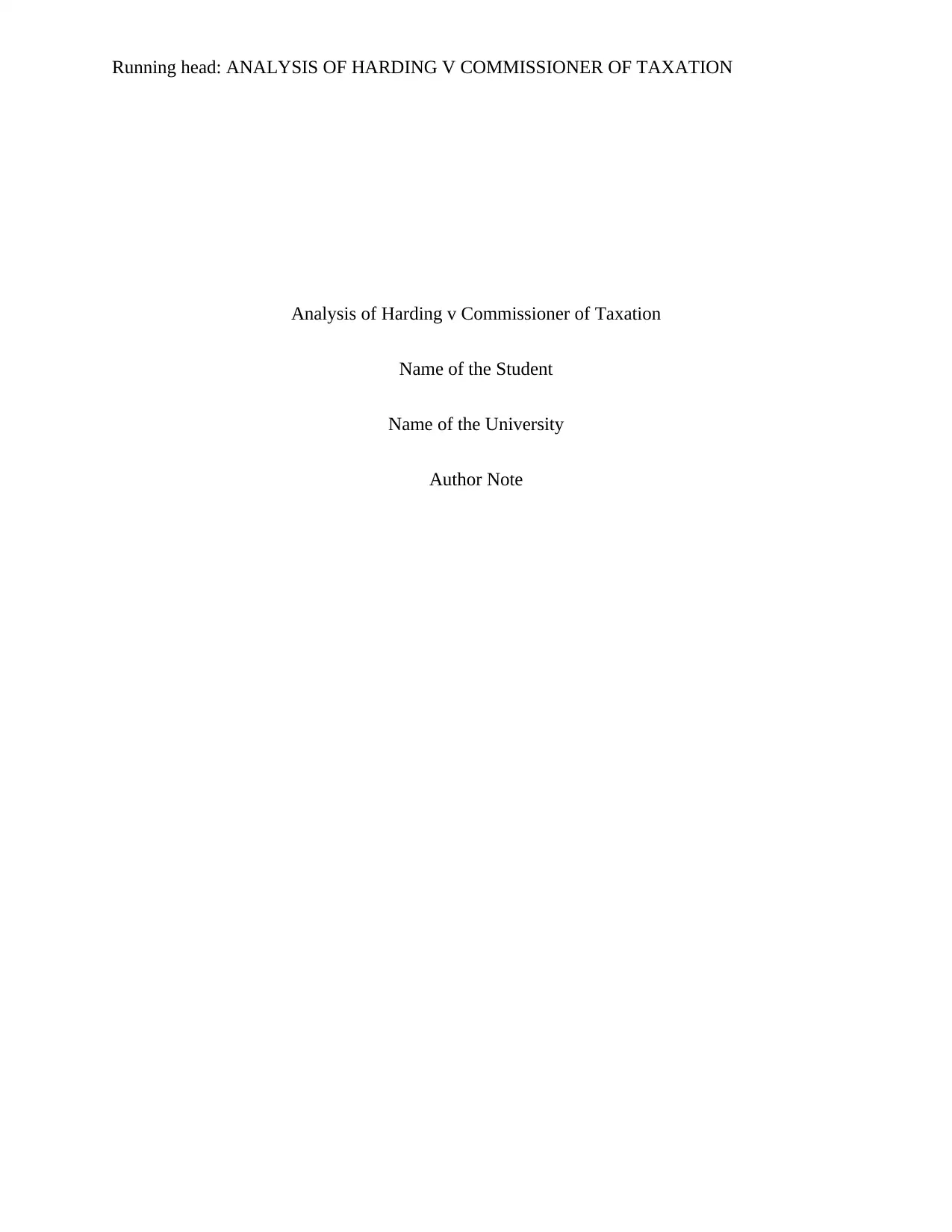
Running head: ANALYSIS OF HARDING V COMMISSIONER OF TAXATION
Analysis of Harding v Commissioner of Taxation
Name of the Student
Name of the University
Author Note
Analysis of Harding v Commissioner of Taxation
Name of the Student
Name of the University
Author Note
Paraphrase This Document
Need a fresh take? Get an instant paraphrase of this document with our AI Paraphraser
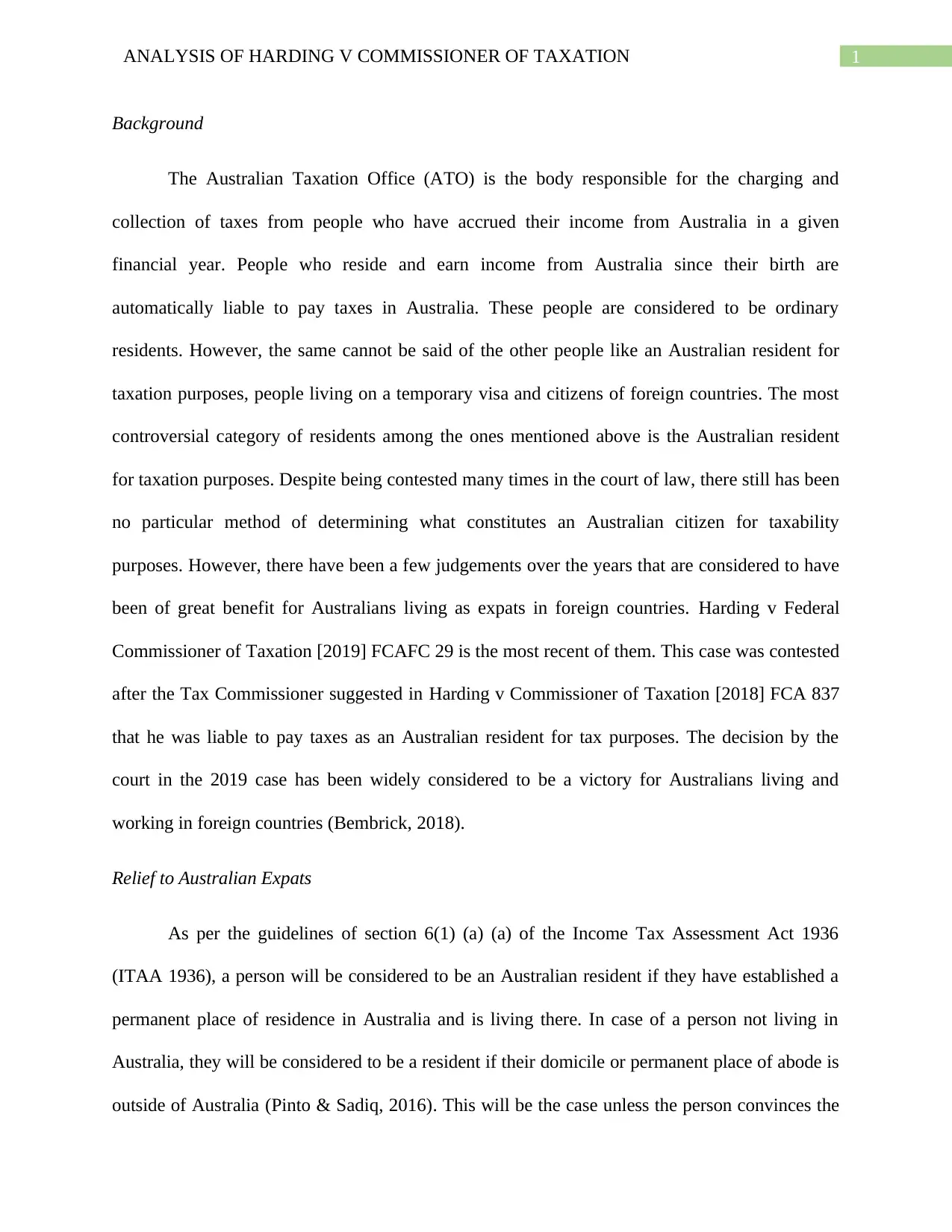
1ANALYSIS OF HARDING V COMMISSIONER OF TAXATION
Background
The Australian Taxation Office (ATO) is the body responsible for the charging and
collection of taxes from people who have accrued their income from Australia in a given
financial year. People who reside and earn income from Australia since their birth are
automatically liable to pay taxes in Australia. These people are considered to be ordinary
residents. However, the same cannot be said of the other people like an Australian resident for
taxation purposes, people living on a temporary visa and citizens of foreign countries. The most
controversial category of residents among the ones mentioned above is the Australian resident
for taxation purposes. Despite being contested many times in the court of law, there still has been
no particular method of determining what constitutes an Australian citizen for taxability
purposes. However, there have been a few judgements over the years that are considered to have
been of great benefit for Australians living as expats in foreign countries. Harding v Federal
Commissioner of Taxation [2019] FCAFC 29 is the most recent of them. This case was contested
after the Tax Commissioner suggested in Harding v Commissioner of Taxation [2018] FCA 837
that he was liable to pay taxes as an Australian resident for tax purposes. The decision by the
court in the 2019 case has been widely considered to be a victory for Australians living and
working in foreign countries (Bembrick, 2018).
Relief to Australian Expats
As per the guidelines of section 6(1) (a) (a) of the Income Tax Assessment Act 1936
(ITAA 1936), a person will be considered to be an Australian resident if they have established a
permanent place of residence in Australia and is living there. In case of a person not living in
Australia, they will be considered to be a resident if their domicile or permanent place of abode is
outside of Australia (Pinto & Sadiq, 2016). This will be the case unless the person convinces the
Background
The Australian Taxation Office (ATO) is the body responsible for the charging and
collection of taxes from people who have accrued their income from Australia in a given
financial year. People who reside and earn income from Australia since their birth are
automatically liable to pay taxes in Australia. These people are considered to be ordinary
residents. However, the same cannot be said of the other people like an Australian resident for
taxation purposes, people living on a temporary visa and citizens of foreign countries. The most
controversial category of residents among the ones mentioned above is the Australian resident
for taxation purposes. Despite being contested many times in the court of law, there still has been
no particular method of determining what constitutes an Australian citizen for taxability
purposes. However, there have been a few judgements over the years that are considered to have
been of great benefit for Australians living as expats in foreign countries. Harding v Federal
Commissioner of Taxation [2019] FCAFC 29 is the most recent of them. This case was contested
after the Tax Commissioner suggested in Harding v Commissioner of Taxation [2018] FCA 837
that he was liable to pay taxes as an Australian resident for tax purposes. The decision by the
court in the 2019 case has been widely considered to be a victory for Australians living and
working in foreign countries (Bembrick, 2018).
Relief to Australian Expats
As per the guidelines of section 6(1) (a) (a) of the Income Tax Assessment Act 1936
(ITAA 1936), a person will be considered to be an Australian resident if they have established a
permanent place of residence in Australia and is living there. In case of a person not living in
Australia, they will be considered to be a resident if their domicile or permanent place of abode is
outside of Australia (Pinto & Sadiq, 2016). This will be the case unless the person convinces the
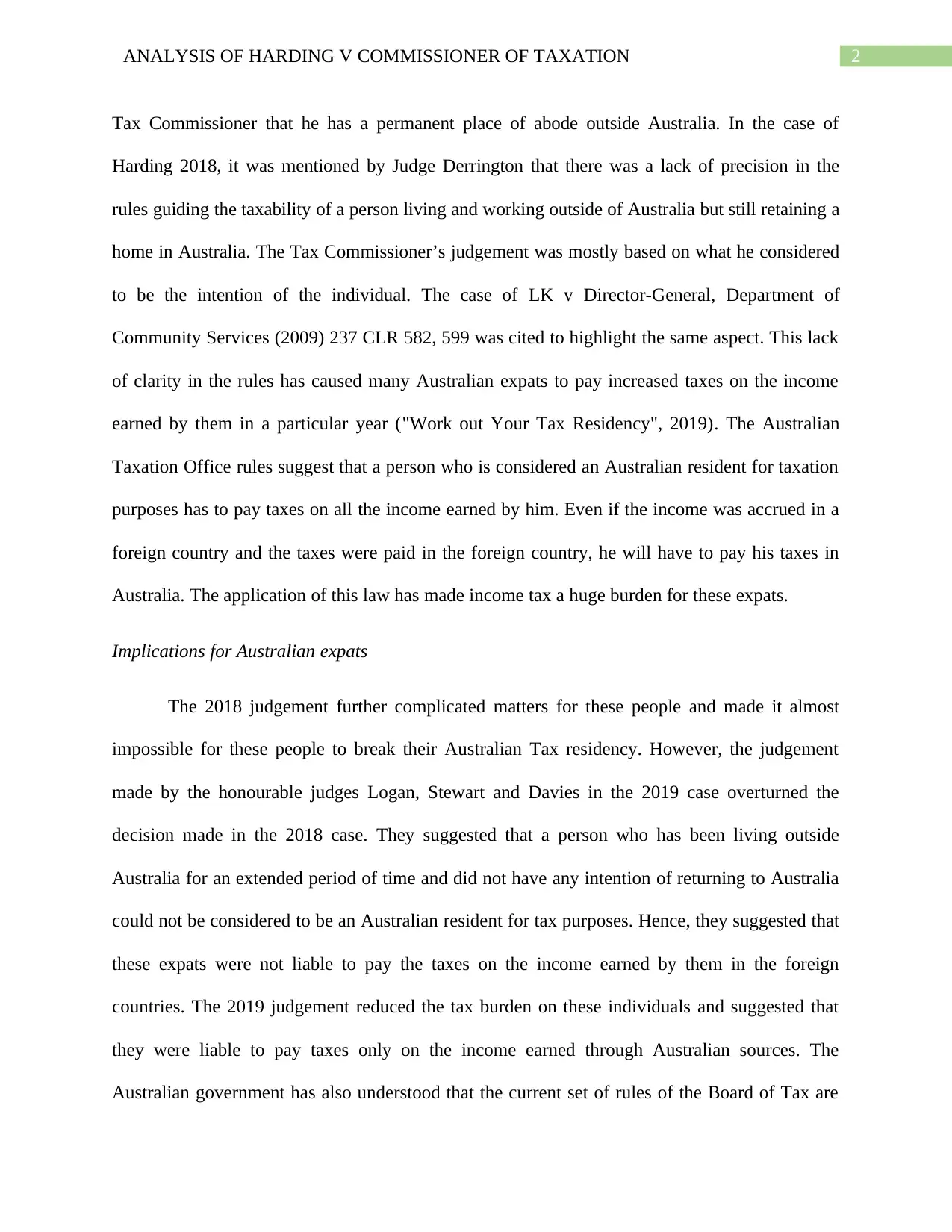
2ANALYSIS OF HARDING V COMMISSIONER OF TAXATION
Tax Commissioner that he has a permanent place of abode outside Australia. In the case of
Harding 2018, it was mentioned by Judge Derrington that there was a lack of precision in the
rules guiding the taxability of a person living and working outside of Australia but still retaining a
home in Australia. The Tax Commissioner’s judgement was mostly based on what he considered
to be the intention of the individual. The case of LK v Director-General, Department of
Community Services (2009) 237 CLR 582, 599 was cited to highlight the same aspect. This lack
of clarity in the rules has caused many Australian expats to pay increased taxes on the income
earned by them in a particular year ("Work out Your Tax Residency", 2019). The Australian
Taxation Office rules suggest that a person who is considered an Australian resident for taxation
purposes has to pay taxes on all the income earned by him. Even if the income was accrued in a
foreign country and the taxes were paid in the foreign country, he will have to pay his taxes in
Australia. The application of this law has made income tax a huge burden for these expats.
Implications for Australian expats
The 2018 judgement further complicated matters for these people and made it almost
impossible for these people to break their Australian Tax residency. However, the judgement
made by the honourable judges Logan, Stewart and Davies in the 2019 case overturned the
decision made in the 2018 case. They suggested that a person who has been living outside
Australia for an extended period of time and did not have any intention of returning to Australia
could not be considered to be an Australian resident for tax purposes. Hence, they suggested that
these expats were not liable to pay the taxes on the income earned by them in the foreign
countries. The 2019 judgement reduced the tax burden on these individuals and suggested that
they were liable to pay taxes only on the income earned through Australian sources. The
Australian government has also understood that the current set of rules of the Board of Tax are
Tax Commissioner that he has a permanent place of abode outside Australia. In the case of
Harding 2018, it was mentioned by Judge Derrington that there was a lack of precision in the
rules guiding the taxability of a person living and working outside of Australia but still retaining a
home in Australia. The Tax Commissioner’s judgement was mostly based on what he considered
to be the intention of the individual. The case of LK v Director-General, Department of
Community Services (2009) 237 CLR 582, 599 was cited to highlight the same aspect. This lack
of clarity in the rules has caused many Australian expats to pay increased taxes on the income
earned by them in a particular year ("Work out Your Tax Residency", 2019). The Australian
Taxation Office rules suggest that a person who is considered an Australian resident for taxation
purposes has to pay taxes on all the income earned by him. Even if the income was accrued in a
foreign country and the taxes were paid in the foreign country, he will have to pay his taxes in
Australia. The application of this law has made income tax a huge burden for these expats.
Implications for Australian expats
The 2018 judgement further complicated matters for these people and made it almost
impossible for these people to break their Australian Tax residency. However, the judgement
made by the honourable judges Logan, Stewart and Davies in the 2019 case overturned the
decision made in the 2018 case. They suggested that a person who has been living outside
Australia for an extended period of time and did not have any intention of returning to Australia
could not be considered to be an Australian resident for tax purposes. Hence, they suggested that
these expats were not liable to pay the taxes on the income earned by them in the foreign
countries. The 2019 judgement reduced the tax burden on these individuals and suggested that
they were liable to pay taxes only on the income earned through Australian sources. The
Australian government has also understood that the current set of rules of the Board of Tax are
⊘ This is a preview!⊘
Do you want full access?
Subscribe today to unlock all pages.

Trusted by 1+ million students worldwide
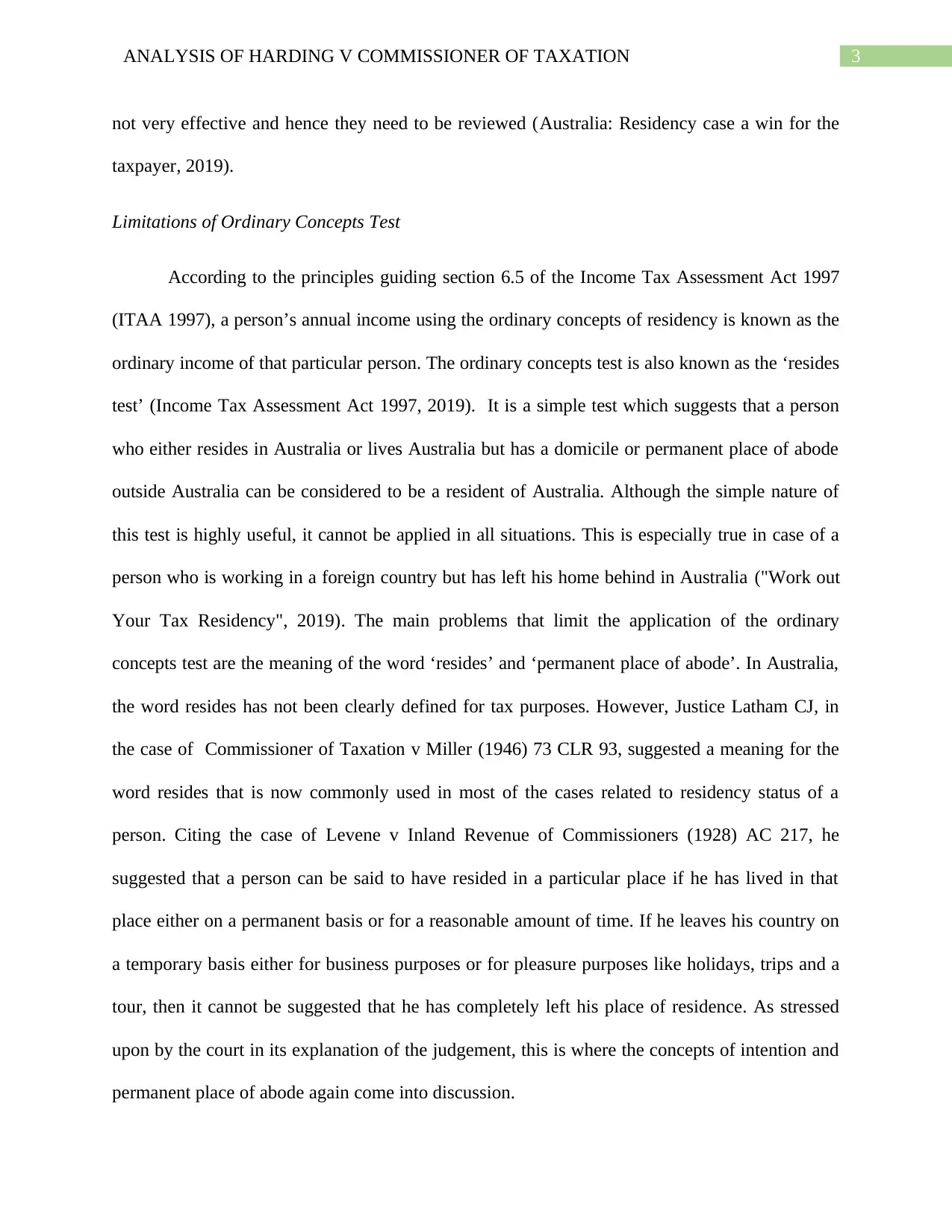
3ANALYSIS OF HARDING V COMMISSIONER OF TAXATION
not very effective and hence they need to be reviewed (Australia: Residency case a win for the
taxpayer, 2019).
Limitations of Ordinary Concepts Test
According to the principles guiding section 6.5 of the Income Tax Assessment Act 1997
(ITAA 1997), a person’s annual income using the ordinary concepts of residency is known as the
ordinary income of that particular person. The ordinary concepts test is also known as the ‘resides
test’ (Income Tax Assessment Act 1997, 2019). It is a simple test which suggests that a person
who either resides in Australia or lives Australia but has a domicile or permanent place of abode
outside Australia can be considered to be a resident of Australia. Although the simple nature of
this test is highly useful, it cannot be applied in all situations. This is especially true in case of a
person who is working in a foreign country but has left his home behind in Australia ("Work out
Your Tax Residency", 2019). The main problems that limit the application of the ordinary
concepts test are the meaning of the word ‘resides’ and ‘permanent place of abode’. In Australia,
the word resides has not been clearly defined for tax purposes. However, Justice Latham CJ, in
the case of Commissioner of Taxation v Miller (1946) 73 CLR 93, suggested a meaning for the
word resides that is now commonly used in most of the cases related to residency status of a
person. Citing the case of Levene v Inland Revenue of Commissioners (1928) AC 217, he
suggested that a person can be said to have resided in a particular place if he has lived in that
place either on a permanent basis or for a reasonable amount of time. If he leaves his country on
a temporary basis either for business purposes or for pleasure purposes like holidays, trips and a
tour, then it cannot be suggested that he has completely left his place of residence. As stressed
upon by the court in its explanation of the judgement, this is where the concepts of intention and
permanent place of abode again come into discussion.
not very effective and hence they need to be reviewed (Australia: Residency case a win for the
taxpayer, 2019).
Limitations of Ordinary Concepts Test
According to the principles guiding section 6.5 of the Income Tax Assessment Act 1997
(ITAA 1997), a person’s annual income using the ordinary concepts of residency is known as the
ordinary income of that particular person. The ordinary concepts test is also known as the ‘resides
test’ (Income Tax Assessment Act 1997, 2019). It is a simple test which suggests that a person
who either resides in Australia or lives Australia but has a domicile or permanent place of abode
outside Australia can be considered to be a resident of Australia. Although the simple nature of
this test is highly useful, it cannot be applied in all situations. This is especially true in case of a
person who is working in a foreign country but has left his home behind in Australia ("Work out
Your Tax Residency", 2019). The main problems that limit the application of the ordinary
concepts test are the meaning of the word ‘resides’ and ‘permanent place of abode’. In Australia,
the word resides has not been clearly defined for tax purposes. However, Justice Latham CJ, in
the case of Commissioner of Taxation v Miller (1946) 73 CLR 93, suggested a meaning for the
word resides that is now commonly used in most of the cases related to residency status of a
person. Citing the case of Levene v Inland Revenue of Commissioners (1928) AC 217, he
suggested that a person can be said to have resided in a particular place if he has lived in that
place either on a permanent basis or for a reasonable amount of time. If he leaves his country on
a temporary basis either for business purposes or for pleasure purposes like holidays, trips and a
tour, then it cannot be suggested that he has completely left his place of residence. As stressed
upon by the court in its explanation of the judgement, this is where the concepts of intention and
permanent place of abode again come into discussion.
Paraphrase This Document
Need a fresh take? Get an instant paraphrase of this document with our AI Paraphraser
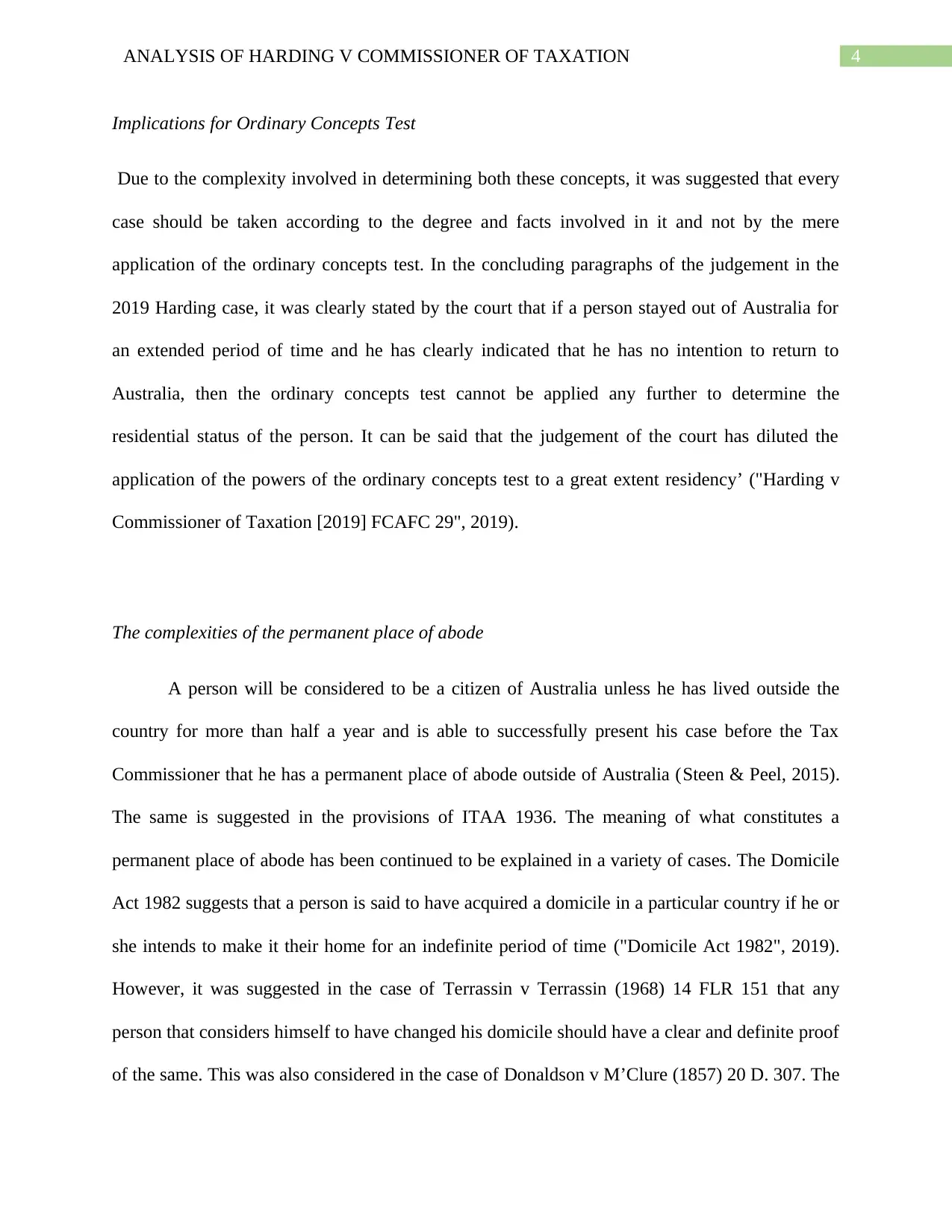
4ANALYSIS OF HARDING V COMMISSIONER OF TAXATION
Implications for Ordinary Concepts Test
Due to the complexity involved in determining both these concepts, it was suggested that every
case should be taken according to the degree and facts involved in it and not by the mere
application of the ordinary concepts test. In the concluding paragraphs of the judgement in the
2019 Harding case, it was clearly stated by the court that if a person stayed out of Australia for
an extended period of time and he has clearly indicated that he has no intention to return to
Australia, then the ordinary concepts test cannot be applied any further to determine the
residential status of the person. It can be said that the judgement of the court has diluted the
application of the powers of the ordinary concepts test to a great extent residency’ ("Harding v
Commissioner of Taxation [2019] FCAFC 29", 2019).
The complexities of the permanent place of abode
A person will be considered to be a citizen of Australia unless he has lived outside the
country for more than half a year and is able to successfully present his case before the Tax
Commissioner that he has a permanent place of abode outside of Australia (Steen & Peel, 2015).
The same is suggested in the provisions of ITAA 1936. The meaning of what constitutes a
permanent place of abode has been continued to be explained in a variety of cases. The Domicile
Act 1982 suggests that a person is said to have acquired a domicile in a particular country if he or
she intends to make it their home for an indefinite period of time ("Domicile Act 1982", 2019).
However, it was suggested in the case of Terrassin v Terrassin (1968) 14 FLR 151 that any
person that considers himself to have changed his domicile should have a clear and definite proof
of the same. This was also considered in the case of Donaldson v M’Clure (1857) 20 D. 307. The
Implications for Ordinary Concepts Test
Due to the complexity involved in determining both these concepts, it was suggested that every
case should be taken according to the degree and facts involved in it and not by the mere
application of the ordinary concepts test. In the concluding paragraphs of the judgement in the
2019 Harding case, it was clearly stated by the court that if a person stayed out of Australia for
an extended period of time and he has clearly indicated that he has no intention to return to
Australia, then the ordinary concepts test cannot be applied any further to determine the
residential status of the person. It can be said that the judgement of the court has diluted the
application of the powers of the ordinary concepts test to a great extent residency’ ("Harding v
Commissioner of Taxation [2019] FCAFC 29", 2019).
The complexities of the permanent place of abode
A person will be considered to be a citizen of Australia unless he has lived outside the
country for more than half a year and is able to successfully present his case before the Tax
Commissioner that he has a permanent place of abode outside of Australia (Steen & Peel, 2015).
The same is suggested in the provisions of ITAA 1936. The meaning of what constitutes a
permanent place of abode has been continued to be explained in a variety of cases. The Domicile
Act 1982 suggests that a person is said to have acquired a domicile in a particular country if he or
she intends to make it their home for an indefinite period of time ("Domicile Act 1982", 2019).
However, it was suggested in the case of Terrassin v Terrassin (1968) 14 FLR 151 that any
person that considers himself to have changed his domicile should have a clear and definite proof
of the same. This was also considered in the case of Donaldson v M’Clure (1857) 20 D. 307. The
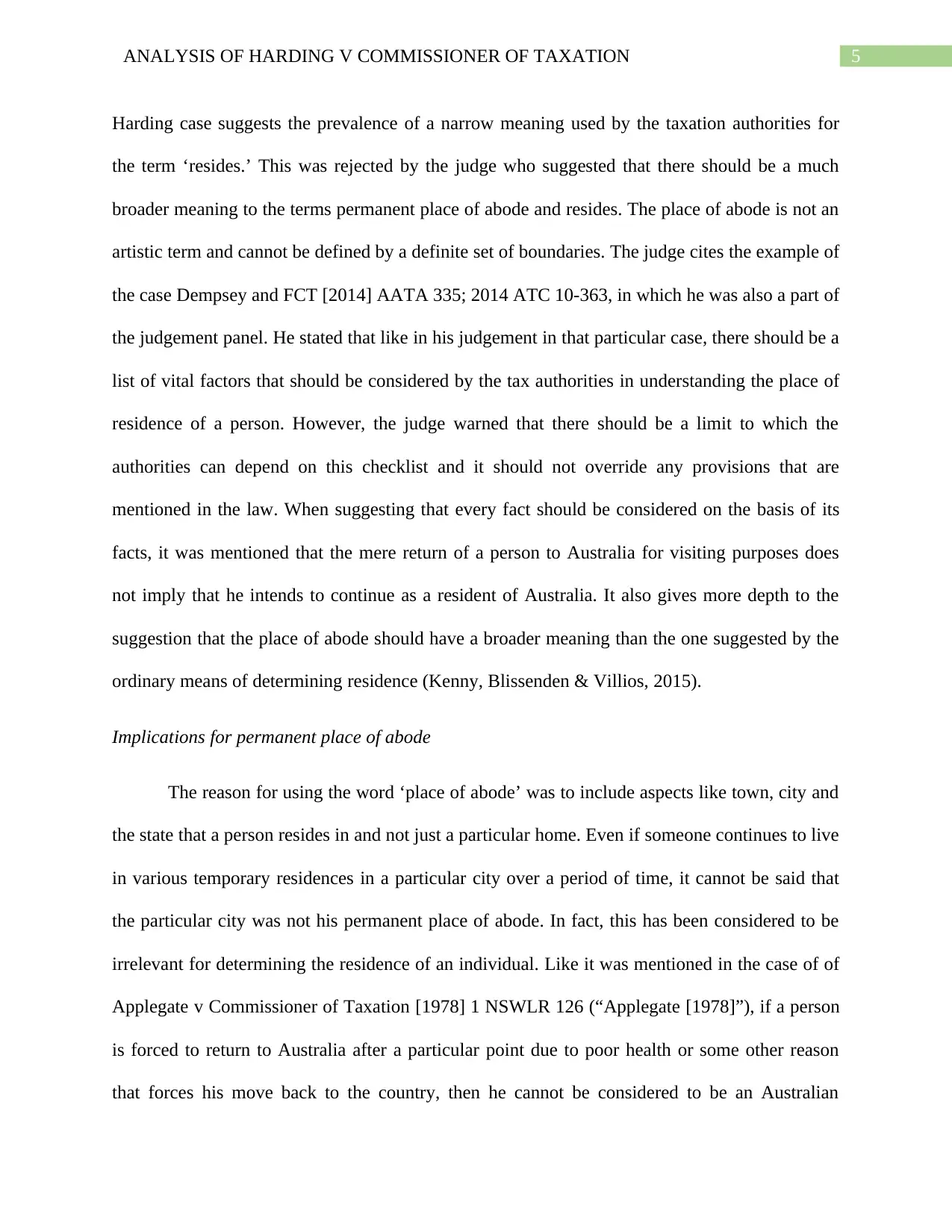
5ANALYSIS OF HARDING V COMMISSIONER OF TAXATION
Harding case suggests the prevalence of a narrow meaning used by the taxation authorities for
the term ‘resides.’ This was rejected by the judge who suggested that there should be a much
broader meaning to the terms permanent place of abode and resides. The place of abode is not an
artistic term and cannot be defined by a definite set of boundaries. The judge cites the example of
the case Dempsey and FCT [2014] AATA 335; 2014 ATC 10-363, in which he was also a part of
the judgement panel. He stated that like in his judgement in that particular case, there should be a
list of vital factors that should be considered by the tax authorities in understanding the place of
residence of a person. However, the judge warned that there should be a limit to which the
authorities can depend on this checklist and it should not override any provisions that are
mentioned in the law. When suggesting that every fact should be considered on the basis of its
facts, it was mentioned that the mere return of a person to Australia for visiting purposes does
not imply that he intends to continue as a resident of Australia. It also gives more depth to the
suggestion that the place of abode should have a broader meaning than the one suggested by the
ordinary means of determining residence (Kenny, Blissenden & Villios, 2015).
Implications for permanent place of abode
The reason for using the word ‘place of abode’ was to include aspects like town, city and
the state that a person resides in and not just a particular home. Even if someone continues to live
in various temporary residences in a particular city over a period of time, it cannot be said that
the particular city was not his permanent place of abode. In fact, this has been considered to be
irrelevant for determining the residence of an individual. Like it was mentioned in the case of of
Applegate v Commissioner of Taxation [1978] 1 NSWLR 126 (“Applegate [1978]”), if a person
is forced to return to Australia after a particular point due to poor health or some other reason
that forces his move back to the country, then he cannot be considered to be an Australian
Harding case suggests the prevalence of a narrow meaning used by the taxation authorities for
the term ‘resides.’ This was rejected by the judge who suggested that there should be a much
broader meaning to the terms permanent place of abode and resides. The place of abode is not an
artistic term and cannot be defined by a definite set of boundaries. The judge cites the example of
the case Dempsey and FCT [2014] AATA 335; 2014 ATC 10-363, in which he was also a part of
the judgement panel. He stated that like in his judgement in that particular case, there should be a
list of vital factors that should be considered by the tax authorities in understanding the place of
residence of a person. However, the judge warned that there should be a limit to which the
authorities can depend on this checklist and it should not override any provisions that are
mentioned in the law. When suggesting that every fact should be considered on the basis of its
facts, it was mentioned that the mere return of a person to Australia for visiting purposes does
not imply that he intends to continue as a resident of Australia. It also gives more depth to the
suggestion that the place of abode should have a broader meaning than the one suggested by the
ordinary means of determining residence (Kenny, Blissenden & Villios, 2015).
Implications for permanent place of abode
The reason for using the word ‘place of abode’ was to include aspects like town, city and
the state that a person resides in and not just a particular home. Even if someone continues to live
in various temporary residences in a particular city over a period of time, it cannot be said that
the particular city was not his permanent place of abode. In fact, this has been considered to be
irrelevant for determining the residence of an individual. Like it was mentioned in the case of of
Applegate v Commissioner of Taxation [1978] 1 NSWLR 126 (“Applegate [1978]”), if a person
is forced to return to Australia after a particular point due to poor health or some other reason
that forces his move back to the country, then he cannot be considered to be an Australian
⊘ This is a preview!⊘
Do you want full access?
Subscribe today to unlock all pages.

Trusted by 1+ million students worldwide
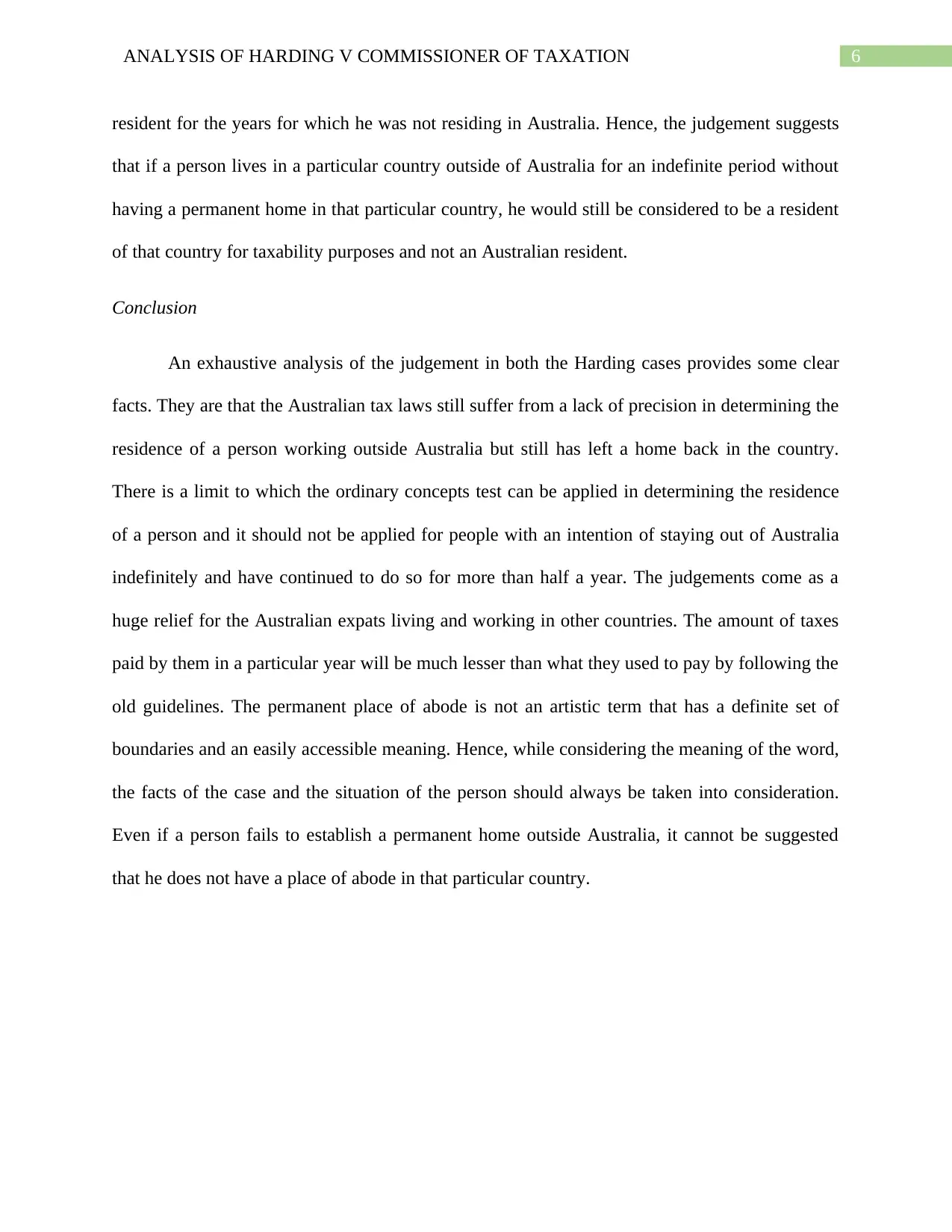
6ANALYSIS OF HARDING V COMMISSIONER OF TAXATION
resident for the years for which he was not residing in Australia. Hence, the judgement suggests
that if a person lives in a particular country outside of Australia for an indefinite period without
having a permanent home in that particular country, he would still be considered to be a resident
of that country for taxability purposes and not an Australian resident.
Conclusion
An exhaustive analysis of the judgement in both the Harding cases provides some clear
facts. They are that the Australian tax laws still suffer from a lack of precision in determining the
residence of a person working outside Australia but still has left a home back in the country.
There is a limit to which the ordinary concepts test can be applied in determining the residence
of a person and it should not be applied for people with an intention of staying out of Australia
indefinitely and have continued to do so for more than half a year. The judgements come as a
huge relief for the Australian expats living and working in other countries. The amount of taxes
paid by them in a particular year will be much lesser than what they used to pay by following the
old guidelines. The permanent place of abode is not an artistic term that has a definite set of
boundaries and an easily accessible meaning. Hence, while considering the meaning of the word,
the facts of the case and the situation of the person should always be taken into consideration.
Even if a person fails to establish a permanent home outside Australia, it cannot be suggested
that he does not have a place of abode in that particular country.
resident for the years for which he was not residing in Australia. Hence, the judgement suggests
that if a person lives in a particular country outside of Australia for an indefinite period without
having a permanent home in that particular country, he would still be considered to be a resident
of that country for taxability purposes and not an Australian resident.
Conclusion
An exhaustive analysis of the judgement in both the Harding cases provides some clear
facts. They are that the Australian tax laws still suffer from a lack of precision in determining the
residence of a person working outside Australia but still has left a home back in the country.
There is a limit to which the ordinary concepts test can be applied in determining the residence
of a person and it should not be applied for people with an intention of staying out of Australia
indefinitely and have continued to do so for more than half a year. The judgements come as a
huge relief for the Australian expats living and working in other countries. The amount of taxes
paid by them in a particular year will be much lesser than what they used to pay by following the
old guidelines. The permanent place of abode is not an artistic term that has a definite set of
boundaries and an easily accessible meaning. Hence, while considering the meaning of the word,
the facts of the case and the situation of the person should always be taken into consideration.
Even if a person fails to establish a permanent home outside Australia, it cannot be suggested
that he does not have a place of abode in that particular country.
Paraphrase This Document
Need a fresh take? Get an instant paraphrase of this document with our AI Paraphraser
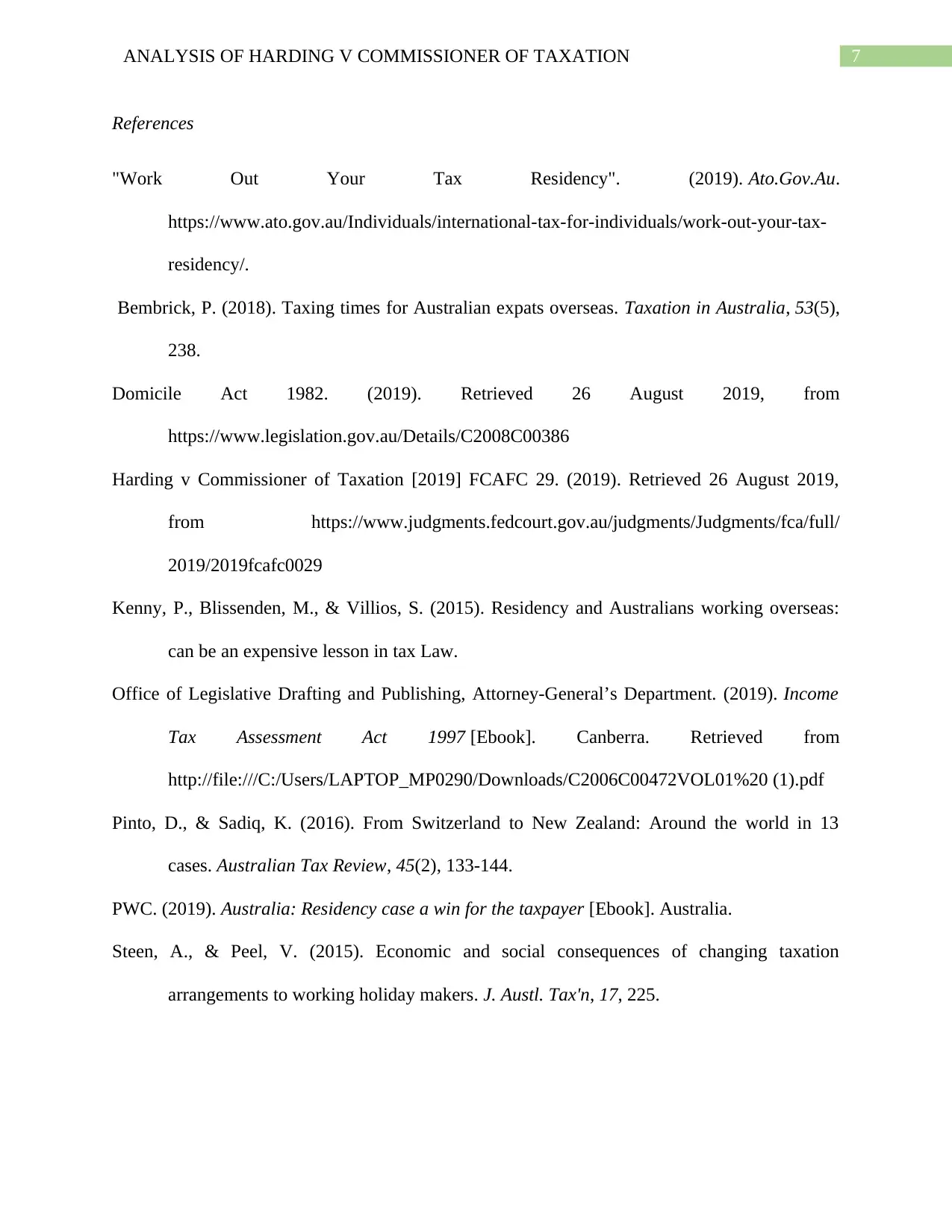
7ANALYSIS OF HARDING V COMMISSIONER OF TAXATION
References
"Work Out Your Tax Residency". (2019). Ato.Gov.Au.
https://www.ato.gov.au/Individuals/international-tax-for-individuals/work-out-your-tax-
residency/.
Bembrick, P. (2018). Taxing times for Australian expats overseas. Taxation in Australia, 53(5),
238.
Domicile Act 1982. (2019). Retrieved 26 August 2019, from
https://www.legislation.gov.au/Details/C2008C00386
Harding v Commissioner of Taxation [2019] FCAFC 29. (2019). Retrieved 26 August 2019,
from https://www.judgments.fedcourt.gov.au/judgments/Judgments/fca/full/
2019/2019fcafc0029
Kenny, P., Blissenden, M., & Villios, S. (2015). Residency and Australians working overseas:
can be an expensive lesson in tax Law.
Office of Legislative Drafting and Publishing, Attorney-General’s Department. (2019). Income
Tax Assessment Act 1997 [Ebook]. Canberra. Retrieved from
http://file:///C:/Users/LAPTOP_MP0290/Downloads/C2006C00472VOL01%20 (1).pdf
Pinto, D., & Sadiq, K. (2016). From Switzerland to New Zealand: Around the world in 13
cases. Australian Tax Review, 45(2), 133-144.
PWC. (2019). Australia: Residency case a win for the taxpayer [Ebook]. Australia.
Steen, A., & Peel, V. (2015). Economic and social consequences of changing taxation
arrangements to working holiday makers. J. Austl. Tax'n, 17, 225.
References
"Work Out Your Tax Residency". (2019). Ato.Gov.Au.
https://www.ato.gov.au/Individuals/international-tax-for-individuals/work-out-your-tax-
residency/.
Bembrick, P. (2018). Taxing times for Australian expats overseas. Taxation in Australia, 53(5),
238.
Domicile Act 1982. (2019). Retrieved 26 August 2019, from
https://www.legislation.gov.au/Details/C2008C00386
Harding v Commissioner of Taxation [2019] FCAFC 29. (2019). Retrieved 26 August 2019,
from https://www.judgments.fedcourt.gov.au/judgments/Judgments/fca/full/
2019/2019fcafc0029
Kenny, P., Blissenden, M., & Villios, S. (2015). Residency and Australians working overseas:
can be an expensive lesson in tax Law.
Office of Legislative Drafting and Publishing, Attorney-General’s Department. (2019). Income
Tax Assessment Act 1997 [Ebook]. Canberra. Retrieved from
http://file:///C:/Users/LAPTOP_MP0290/Downloads/C2006C00472VOL01%20 (1).pdf
Pinto, D., & Sadiq, K. (2016). From Switzerland to New Zealand: Around the world in 13
cases. Australian Tax Review, 45(2), 133-144.
PWC. (2019). Australia: Residency case a win for the taxpayer [Ebook]. Australia.
Steen, A., & Peel, V. (2015). Economic and social consequences of changing taxation
arrangements to working holiday makers. J. Austl. Tax'n, 17, 225.

8ANALYSIS OF HARDING V COMMISSIONER OF TAXATION
⊘ This is a preview!⊘
Do you want full access?
Subscribe today to unlock all pages.

Trusted by 1+ million students worldwide

9ANALYSIS OF HARDING V COMMISSIONER OF TAXATION
Paraphrase This Document
Need a fresh take? Get an instant paraphrase of this document with our AI Paraphraser

10ANALYSIS OF HARDING V COMMISSIONER OF TAXATION

11ANALYSIS OF HARDING V COMMISSIONER OF TAXATION
References
References
⊘ This is a preview!⊘
Do you want full access?
Subscribe today to unlock all pages.

Trusted by 1+ million students worldwide
1 out of 12
Related Documents
Your All-in-One AI-Powered Toolkit for Academic Success.
+13062052269
info@desklib.com
Available 24*7 on WhatsApp / Email
![[object Object]](/_next/static/media/star-bottom.7253800d.svg)
Unlock your academic potential
Copyright © 2020–2026 A2Z Services. All Rights Reserved. Developed and managed by ZUCOL.





